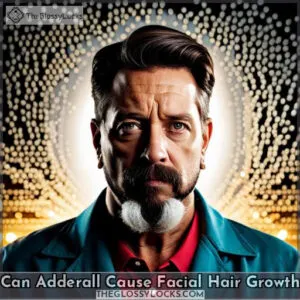This site is supported by our readers. We may earn a commission, at no cost to you, if you purchase through links.
Headaches are a common problem that can be caused by many different things. Have you ever wondered if hair growth could be one of them? While it may not seem possible, there is some evidence to suggest that hair growth and headaches could be connected.
Table Of Contents
- Key Takeaways
- Understanding Headaches
- Causes of Headaches
- Symptoms of Headaches
- Treatment for Headaches
- Can Hair Growth Cause Headaches?
- Other Causes of Headaches
- Frequently Asked Questions (FAQs)
- What are the different types of headaches?
- What are the long-term impacts of having chronic headaches?
- Are there any lifestyle changes I can make to help prevent headaches?
- Are there any medical tests that can diagnose the cause of my headaches?
- Are there any natural remedies that can help alleviate headache symptoms?
- Conclusion
Key Takeaways

- Hair growth can be a cause of headaches.
- Other causes of headaches include environmental and dietary triggers, as well as stress.
- Types of headaches include tension headaches, migraine headaches, and cluster headaches.
- Prevention and management of headaches can involve a variety of strategies, including exercise, dietary changes, adequate sleep hygiene practices, herbal remedies, moderate caffeine consumption, lifestyle changes, and alternative therapies.
Understanding Headaches
Understanding headaches can be difficult, but with the right resources and knowledge, you can better manage them. Exercise is important to reduce stress and regulate hormones associated with headaches.
Diet changes, such as avoiding high-tyramine foods, are also recommended for headache prevention.
Keeping hydrated is essential to keep your blood sugar levels stable. Dehydration may lead to a headache or migraine attack due to low blood sugar levels caused by fluid loss from excessive sweating during exercise, etc.
Adequate sleep hygiene practices should also be followed, as poor sleeping habits have been linked with an increased risk of developing headaches and migraines.
Pituitary hormones play an important role in regulating erectile dysfunction, diabetes mellitus, and growth hormone production. If the growth hormone production is too high, it results in gigantism or acromegaly, among other conditions, including Cushing’s disease, where there’s excess ACTH production from pituitary adenomas.
Therefore, it is necessary to address any underlying medical condition causing elevated hair growth before attempting any treatment option for the resulting headache symptomology.
Causes of Headaches
Headaches are a common health issue, and there are several types of headaches that can affect us. Two of the most common types include tension headaches and migraine headaches. Cluster headaches are another type that is less frequent but more severe in intensity.
While it is unclear if hair growth can directly cause a headache, understanding what causes these different kinds of pain may help us identify potential triggers to avoid or manage them better.
Tension Headaches
Tension headaches can be a frequent and debilitating source of pain that can disrupt your daily life. For example, John was experiencing tension headaches on a weekly basis due to stress from his job, which made it difficult for him to concentrate or perform the tasks he needed for work.
To combat such symptoms, one should consider incorporating aromatherapy into their routine, developing effective stress management techniques, maintaining proper nutrition habits, practicing good sleep hygiene, and engaging in an exercise routine regularly.
Vanderbilt University provides meal ideas and menus, as well as patient education resources on tension headache treatments in adults. The National Headache Foundation offers information about hypoglycemia, smoking, alcohol, nitrites/nitrates triggers researched by Frese A.
Blau et al., Stankewitz et al., Schurks 2008 report, Mukamal’s 2009 & 2008 Neurology research articles, Cleveland Clinic rebound warnings, UC Berkeley Univ Health Services fact sheet, Cathcart 2010 Cephalagia article, Millea 2002 American Family Physician piece, plus info & resources from American Headache Society and UpToDate materials too.
Migraine Headaches
Migraine headaches can be caused by environmental and dietary triggers, such as certain foods, drinks, weather changes, and bright or flickering lights. Strong smells, like perfumes or cleaning products, are also possible triggers. Preventing migraines requires recognizing the specific triggers that affect an individual and making lifestyle changes to avoid them.
Medication options may include over-the-counter medications, as well as prescription drugs. However, coping strategies, such as relaxation techniques, can help relieve symptoms when used in combination with medication.
High prolactin levels and pituitary tumors can cause loss of menstrual periods, which may lead to rebound headaches if left untreated. Thus, it is important for those suffering from migraine headaches to seek out headache treatments recommended by their doctor for the best results.
Cluster Headaches
Cluster headaches, often referred to as the suicide headache, are known for their excruciating pain, which can make a person feel like they’re going mad. Managing this type of pain requires identifying triggers such as alcohol and smoking, along with considering diet for tyramine-rich foods.
Diagnostic tests such as MRI or CT scans may be necessary for further evaluation. Treatment options include medications and physical therapy recommended by the American Headache Society, or suggested in publications like M Current Pain & Headache Report or Cephalalgia.
Neurology studies suggest that pituitary gland dysfunction could also play a role in cluster headache onset. Management of symptoms is key for reducing suffering associated with these debilitating episodes.
Symptoms of Headaches
Headaches can cause a range of symptoms, from mild pressure to intense pain that affects your ability to focus. Preventing headaches requires identifying triggers and making lifestyle changes, such as stress management.
It is also important to look for signs of pituitary tumors, such as trouble with eye movement, vision loss, or facial numbness/pain. If any of these occur along with the headache, seek medical advice immediately. High levels of hormones produced by functional tumors may also be responsible in some cases, leading to diabetes insipidus or Cushing’s Disease.
On the other hand, too little production due to non-functional tumors can affect parts of the brain, causing low blood pressure and menstrual period irregularities in women suffering from prolactinomas.
The key lies in understanding what is enough hormone for an individual’s body, rather than treating it through synthetic drugs only providing temporary relief. These chemicals have long-term side effects on health when taken over time without proper guidance from qualified medical professionals.
Treatment for Headaches
Headaches can be a common problem for many people, but fortunately, there are several treatments you can try. Medications like over-the-counter painkillers and prescription medications can help to reduce the intensity of your headaches.
Making lifestyle changes such as getting enough sleep and avoiding triggers may also provide relief. Other alternative therapies, such as acupuncture or natural remedies, might also be beneficial in helping alleviate discomfort caused by headaches.
Medications
Medications can provide relief from headaches, but it’s important to be aware of potential side effects before taking them. Herbal remedies, such as valerian root, may help reduce headache symptoms without the risk of adverse reactions.
Moderate caffeine consumption has been linked to a reduction in headaches, and some research suggests it could improve migraine symptoms.
According to a 2010 study by UC Berkeley Health Services, diet changes, stress management techniques, and exercise routines are also recommended for reducing headache pain intensity or frequency. However, Cleveland Clinic warns that rebound headaches can occur if medications are taken too frequently or incorrectly.
Additionally, a 2002 study by P American Family Physician suggests limiting caffeine intake over time as tolerance increases, leading to more frequent migraines.
It’s important to note that lifestyle modifications should always accompany medication use when treating chronic headache conditions, as stated in a 2011 study by S Cephalagia. Awareness of potential risks is key for successful treatment plans with minimal side effects when managing head pain episodes.
Lifestyle Changes
Making lifestyle changes, such as modifying your diet, practicing stress management techniques, and undergoing cognitive behavioral therapy, can help reduce the intensity or frequency of headaches. Nutrition therapy involves eliminating foods that are high in tyramine, such as aged cheeses, to prevent migraine attacks.
Sleep hygiene is also important and includes avoiding caffeine close to bedtime and setting a regular sleep schedule for better rest. Incorporating exercise routines into daily life can also help maintain good health, which can combat headache triggers due to its potential anti-inflammatory effects on the body.
If large tumors are causing too much growth hormone, thyroid hormone, or ACTH, additional treatments like surgery or medications may be necessary depending on each individual’s case. If diabetes insipidus is present, too much water may need to be avoided since it can cause dehydration, leading to cephalalgia symptoms and other complications if left unchecked.
Alternative Therapies
Try out alternative therapies such as acupuncture, massage therapy, or yoga to help manage headaches. Studies have shown that these treatments can provide up to a 70% reduction in headache intensity and frequency.
Acupuncture is an ancient Chinese healing practice that involves the insertion of fine needles into the skin at specific points on the body for therapeutic purposes. Aromatherapy uses essential oils extracted from plants and herbs, which are believed to offer medicinal benefits when inhaled or applied topically.
Herbal remedies also use plant extracts with active ingredients that may be beneficial in treating certain conditions, including headaches, due to their anti-inflammatory properties. Hypnosis has been used successfully for pain relief by helping patients relax so they can better cope with their symptoms while reducing stress levels associated with chronic pain syndromes like migraine headaches caused by high tyramine foods.
High GH levels lead to much higher concentrations of thyroid-stimulating hormone than normal. Regular exercise helps keep those numbers down! So try out some alternative therapies today and see what works best for you.
Can Hair Growth Cause Headaches?
Experiencing headaches can be a sign of hair growth. The cause of the headache may vary depending on individual factors such as caffeine intake, sleep habits, stress levels, environmental factors, and diet changes.
Hair growth is not usually the direct cause of a headache, but it could be related to neurological issues or an underlying condition affecting the pituitary gland, like a tumor.
In some cases, hormone imbalances due to excessive hair growth can cause vision changes and weight gain, which could lead to high blood pressure and headaches. If you are experiencing persistent headaches along with rapid hair growth, consulting your doctor is recommended for further diagnosis and treatment options tailored specifically towards addressing your symptoms.
Other Causes of Headaches
Understanding the various triggers for headaches can help you better manage your symptoms. While hair growth may not directly cause a headache, there are other factors that could be causing discomfort.
Yoga has been known to reduce stress levels and improve sleep habits, which in turn can lead to fewer headaches. Rebound headaches, caused by overuse of medications, are also common and should be monitored closely if medication is being used on a regular basis.
Food intolerances can also trigger migraines, so it’s important to pay attention if certain foods seem to give you more trouble than others after eating them. Stress levels have been linked with increased risk of tension-type or cluster-type headaches as well as migraine episodes, so finding ways to manage stress is key in preventing these types of pain episodes from occurring often or becoming chronic issues for sufferers.
Neurology studies have shown that changes within blood vessels near follicle-stimulating hormone receptors can activate pain pathways leading up into the brain itself. However, further research would need to be done before any conclusions could be made about this connection specifically when looking at hair growth exclusively.
High mineral levels, such as sodium and calcium, may cause some people extra difficulties with body hair regrowth, but again, no direct connection between head pains arising due simply from growing out one’s locks has yet been established definitively.
Knowing what might contribute towards triggering an episode though gives individuals greater power over their own wellbeing.
Frequently Asked Questions (FAQs)
What are the different types of headaches?
Headaches can range from tension headaches to migraines. For example, a migraine may cause throbbing pain and sensitivity to light. People may also experience rebound headaches due to overuse of medication or hypoglycemia.
Smoking, alcohol, and nitrites/nitrates are all common triggers for headache pain as well. It’s important to talk with your doctor if you’re experiencing frequent or severe headaches.
What are the long-term impacts of having chronic headaches?
Dealing with chronic headaches can result in long-term impacts, such as an increased risk of depression and anxiety. It may also cause sensitivity to light or sound, difficulty concentrating, and a reduced quality of life.
Are there any lifestyle changes I can make to help prevent headaches?
Lifestyle changes that may help prevent headaches include avoiding known triggers such as smoking, alcohol, nitrites/nitrates, and hypoglycemia. Eating a balanced diet and avoiding high tyramine foods can also be beneficial. Additionally, regular exercise to reduce stress levels can provide relief from tension headaches.
Lastly, getting enough sleep every night is important in preventing future episodes of pain or discomfort.
Are there any medical tests that can diagnose the cause of my headaches?
Consult with your doctor regarding medical tests that can diagnose the cause of your headaches. Tests such as MRI, CT scans, and blood work can aid in identifying underlying causes such as pituitary tumors or aneurysms.
Additionally, it is worth considering that up to 50% of individuals who experience headaches may encounter rebound symptoms after regular medication use before starting treatment.
Are there any natural remedies that can help alleviate headache symptoms?
Studies show that as many as 70% of headaches can be relieved naturally. To alleviate headache symptoms, try staying hydrated, practicing relaxation techniques such as yoga or meditation, and avoiding triggers like alcohol and smoking.
Conclusion
Headaches are a common issue that can affect your quality of life. Understanding the causes and treatments can help you manage your symptoms and feel better. Hair growth can cause headaches in some individuals, but it is often the result of an underlying condition.
Other causes of headaches include tension, migraines, cluster headaches, and pituitary tumors. Seeking medical advice is essential if you experience headaches, as it can help determine the cause and provide effective treatments.
While hair growth may not be the primary cause of your headaches, it is important to speak with a doctor to ensure that you are getting the care you need.



